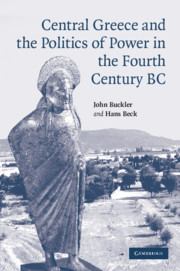Book contents
- Frontmatter
- Contents
- List of maps
- Preface
- Acknowledgments
- List of abbreviations
- Prologue
- Part I ALLIANCE
- Chapter 1 A survey of Theban and Athenian relations between 403–371 BC
- Chapter 2 The incident at Mt. Parnassus, 395 BC
- Chapter 3 The battle of Coronea and its historiographical legacy
- Chapter 4 The King's Peace, alliance, and Phoebidas’ strike (382 BC)
- Chapter 5 Sphodrias' raid and the evolution of the Athenian League
- Part II HEGEMONY
- Part III DOMINATION
- Epilogue
- Glossary
- References
- Index
Chapter 4 - The King's Peace, alliance, and Phoebidas’ strike (382 BC)
from Part I - ALLIANCE
Published online by Cambridge University Press: 22 September 2009
- Frontmatter
- Contents
- List of maps
- Preface
- Acknowledgments
- List of abbreviations
- Prologue
- Part I ALLIANCE
- Chapter 1 A survey of Theban and Athenian relations between 403–371 BC
- Chapter 2 The incident at Mt. Parnassus, 395 BC
- Chapter 3 The battle of Coronea and its historiographical legacy
- Chapter 4 The King's Peace, alliance, and Phoebidas’ strike (382 BC)
- Chapter 5 Sphodrias' raid and the evolution of the Athenian League
- Part II HEGEMONY
- Part III DOMINATION
- Epilogue
- Glossary
- References
- Index
Summary
The great battles of the Corinthian War admirably served the Persian king's purposes. Those Greek states opposed to Sparta had won some of the big encounters but not the war. In the process all of Greece weakened and distracted itself. Nonetheless, Thebes had re-established its authority in most of Boeotia, and Athens threatened to rebuild its fifth-century empire. The astute Spartan Antalcidas realized that some sort of victory remained possible only when his countrymen abandoned their anti-Persian policy. With Spartan blessing and indeed encouragement he arranged with King Artaxerxes a solution that for them both promised a satisfactory end of the war. In 386 the King sent his satrap Tiribazus to present the Greeks with his peace demands. The Spartans duly summoned all of the belligerents to send delegates to Sparta to hear and ratify the document. The number and identities of the Greek embassies that thereby convened are unknown. Yet in addition to those of the major powers, many other Greek states had good reason to participate not only because to some extent all had become involved in the nine-year conflict but also because the entire outcome would affect them all. Territorial disputes would surely arise, and no significant party would wish to remain voiceless in an assembly intended to resolve these matters.
When Agesilaus as king, not Antalcidas despite his diplomatic success, convened the session at Sparta, Tiribazus presented the King's seal and read his message.
- Type
- Chapter
- Information
- Publisher: Cambridge University PressPrint publication year: 2008

